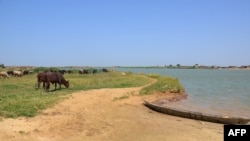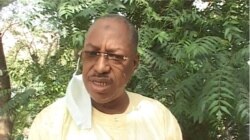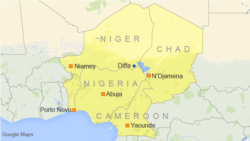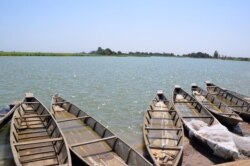Cameroonian authorities are urging thousands of villagers who fled northern Cameroon after a violent conflict between herders and fishers this week to return home. The villagers fled across the border into neighboring Chad after clashes over resources left farms and villages destroyed.
Cameroon says the conflict between cattle ranchers and fishermen has displaced people in Logone and Chari villages, but residents are reluctant to return due to concerns of ongoing violence in the country’s northern border with Chad.
Midjiyawa Bakari is the governor of Cameroon’s Far North region, where the Logone and Chari Division is located.
Bakari insists that Mousgoum fishermen and Arab Choua cattle ranchers are fighting over water resources to maintain control over their natural habitats. He wants all civilians to know that Mousgoum fishermen also clash among themselves over water in fishing areas. He adds that the Arab Choua cattle ranchers have informed Cameroon government officials on several occasions that their peers allow cattle to stray out of ranches in search of water, causing tensions between Arab Choua cattle ranchers.
Bakari said Mosgoum and Arab Choua communities are not fighting to chase each other from territories they have been living in for decades.
Last week, the central African nation reported at least 11,000 civilians were displaced by conflicts between Mousgoum fishermen and Arab Choua cattle ranchers over water usage. Cameroon said 10,000 civilians jumped across the Logone river separating Cameroon and Chad to Chadian border towns and villages.
Kamssouloum Abba Kabir is an Arab Choua community leader and a lawmaker in Cameroon National Assembly’s lower house of parliament. He says peace is gradually returning to both communities.
He is pleading with displaced Arab Choua community in Cameroon and Chad to return home, he says, seeking peace and hoping to reconcile. He has called on the Arab Choua community members in Logone and Chari, an administrative unit on Cameroon’s northern border with Chad, to drop their weapons for peace and return.
Cameroon President Paul Biya held a 5th crisis meeting in Kousseri, the capital of Logone and Chari Division Monday. During the meeting, it was reported that 43 people have been killed and more than one hundred wounded in the clashes, including 40 villages burned.
Dougmbe Ahamat, a fisherman and spokesperson of the Mosgoum community, says civilians fear returning because their livelihoods have been destroyed.
"It is difficult for displaced Mosgoum fishermen and their families to return when their villages have been burnt down and fishing lands destroyed," he said. "The social and economic consequences of the clashes are enormous, and many men were killed, and their wives and children do not know who to rely on."
Bakari said the government will be sending assistance to the victims but did not say when. He, however, distributed food and matrasses to at least 200 displaced people who returned on Monday.
Mahamat Bahar Marouf is a traditional leader also known as Sultan of Logone-Birni, in another town in Logone and Chari Division.
Marouf says the Mosgoum and Arab Choua communities should learn to settle their disputes peacefully because they will forever live in Logone and Chari. "Fighting instead of exploiting limited natural resources in a sustainable manner will only bring misery to both communities, deepen poverty and underdevelopment," he said.
Cameroon says it will send government officials, cleric and traditional rulers to Chad in the coming days to encourage people to return home.







